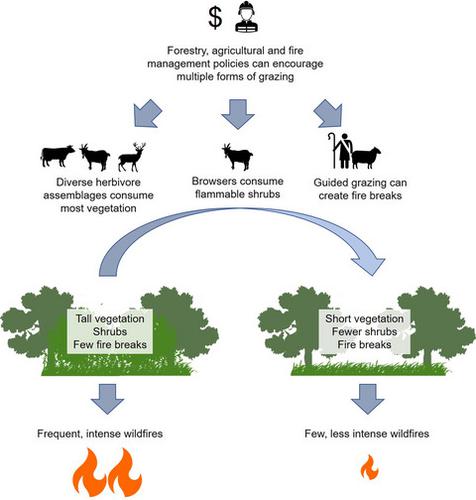当前位置:
X-MOL 学术
›
J. Appl. Ecol.
›
论文详情
Our official English website, www.x-mol.net, welcomes your
feedback! (Note: you will need to create a separate account there.)
Effects of large herbivores on fire regimes and wildfire mitigation
Journal of Applied Ecology ( IF 5.0 ) Pub Date : 2021-09-05 , DOI: 10.1111/1365-2664.13972 Julia Rouet‐Leduc 1, 2, 3 , Guy Pe'er 1, 3 , Francisco Moreira 4, 5 , Aletta Bonn 1, 3, 6 , Wouter Helmer 7 , Shahin A. A. Shahsavan Zadeh 8 , Alexander Zizka 1, 9 , Fons van der Plas 2, 10
中文翻译:

大型食草动物对火灾状况和减轻野火的影响
更新日期:2021-09-05
Journal of Applied Ecology ( IF 5.0 ) Pub Date : 2021-09-05 , DOI: 10.1111/1365-2664.13972 Julia Rouet‐Leduc 1, 2, 3 , Guy Pe'er 1, 3 , Francisco Moreira 4, 5 , Aletta Bonn 1, 3, 6 , Wouter Helmer 7 , Shahin A. A. Shahsavan Zadeh 8 , Alexander Zizka 1, 9 , Fons van der Plas 2, 10
Affiliation

|
- Abandonment of agricultural land is widespread in many parts of the world, leading to shrub and tree encroachment. The increase of flammable plant biomass, that is, fuel load, increases the risk and intensity of wildfires. Fuel reduction by herbivores is a promising management strategy to avoid fuel build-up and mitigate wildfires. However, their effectiveness in mitigating wildfire damage may depend on a range of factors, including herbivore type, population density and feeding patterns.
- Here, we review the evidence on whether management with herbivores can reduce fuel load and mitigate wildfires, and if so, how to identify suitable management that can achieve fire mitigation objectives while providing other ecosystem services. We systematically reviewed studies that investigated links between herbivores, fire hazard, fire frequency and fire damage.
- We found that, in general, herbivores reduce fuel load most effectively when they are mixed feeders, when grazing and browsing herbivores are combined and when herbivore food preferences match the local vegetation. In some cases, the combination of herbivory with other management strategies, such as mechanical clearing, is necessary to reduce wildfire damage.
- Synthesis and Applications. We conclude that herbivores have the capacity to mitigate wildfire damage, and we provide guidance for grazing management for wildfire mitigation strategies. As areas undergoing land abandonment are particularly prone to wildfires, the maintenance or promotion of grazing by domestic or wild herbivores is a promising tool to reduce wildfire risk in a cost-effective way, while also providing other ecosystem services. Relevant land-use policies, including fire suppression policies, agricultural and forest(ry) policies could incentivise the use of herbivores for better wildfire prevention.
中文翻译:

大型食草动物对火灾状况和减轻野火的影响
- 世界许多地方普遍存在农用地被遗弃的情况,导致灌木和树木被侵占。可燃植物生物量的增加,即燃料负荷,增加了野火的风险和强度。食草动物减少燃料是一种很有前途的管理策略,可以避免燃料积聚和减轻野火。然而,它们在减轻野火损害方面的有效性可能取决于一系列因素,包括食草动物类型、种群密度和饲养模式。
- 在这里,我们回顾了关于草食动物管理是否可以减少燃料负荷和减轻野火的证据,如果可以,如何确定可以在提供其他生态系统服务的同时实现火灾缓解目标的合适管理。我们系统地回顾了调查食草动物、火灾危险、火灾频率和火灾损失之间联系的研究。
- 我们发现,一般而言,当食草动物混合饲养、放牧和浏览食草动物相结合以及食草动物的食物偏好与当地植被相匹配时,食草动物可以最有效地减少燃料负荷。在某些情况下,需要将食草动物与其他管理策略(例如机械清除)相结合,以减少野火造成的损失。
- 合成与应用。我们得出的结论是,食草动物有能力减轻野火损害,并且我们为野火缓解策略的放牧管理提供指导。由于土地被遗弃的地区特别容易发生野火,因此维持或促进家养或野生食草动物的放牧是以具有成本效益的方式减少野火风险的有前途的工具,同时还提供其他生态系统服务。相关的土地使用政策,包括灭火政策、农业和森林(ry)政策,可以激励使用食草动物来更好地预防野火。











































 京公网安备 11010802027423号
京公网安备 11010802027423号